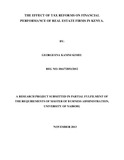| dc.description.abstract | Tax reforms determine economic growth, equitable development and financing of an adequate
level of social public expenditure for growth while limiting budget deficits. It is usually used as a
requirement for financial assistance to developing countries’ governments by international
development agencies. The effects of Tax reforms on the financial performance of real estate
firms are very critical to the government and particularly to the Kenya Revenue Authority whose
mandate is to administer and enforce laws relating to revenue collection on behalf of the
government. It forms the basis for this study.
Previous empirical studies on tax reforms have exclusively focused on the impact of tax reforms
on various sectors of the economy other than on its effects on financial performance. Arising
from those studies, a number of key findings as well as limitations emerge that have informed the
structure and approach of this study. Previous studies portray hostility between the taxpayers and
tax collectors on issue relating to tax reforms. Equally, the studies present sounding evidence
indicating that taxpayers are able to complete on-line filing with much easy where the
government provides a more user-friendly on-line tax filing system.
The results of this study show that tax reforms have a positive effect on the
financial performance of the real estate firms in Kenya. However, those effects are rather weak.
Of the determinants explored, experience in the implementation of tax reforms, filling of returns
on-line and tax relief present the most influencing positive effect on the financial performance of
the real estate firms; with implementation of tax reforms taking the most single important position
in influencing financial performance.
The action of taxpayers, whether due to ignorance, deliberate evasion or weaknesses in the tax
administration implies that non-compliance with the tax law remains a challenge? To curb this, tax
administration authorities should put in place strategies, structures and systems that ensure that noncompliance
with tax reform laws is kept to minimum. They should also implement computer-assisted
tax reform programs that are well balanced and incorporate a good mix of both proactive and reactive
systems as well as approaches that cover all aspects of tax reforms management from education
through enforcement to prosecution. In addition, the reform programs should be designed in such a
manner as to leave economic behavior unaffected, minimize efficiency losses associated with any new
reform system while at the same time yield sufficient revenues to fund socially and economically
empowering programs without creating substantial inequity. | en |

